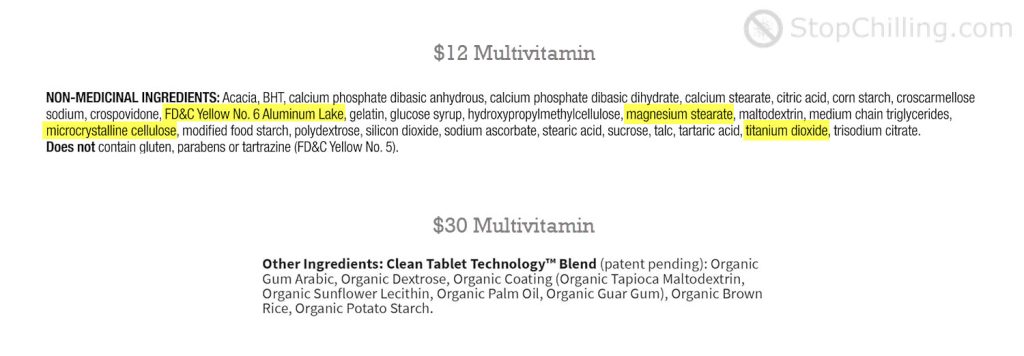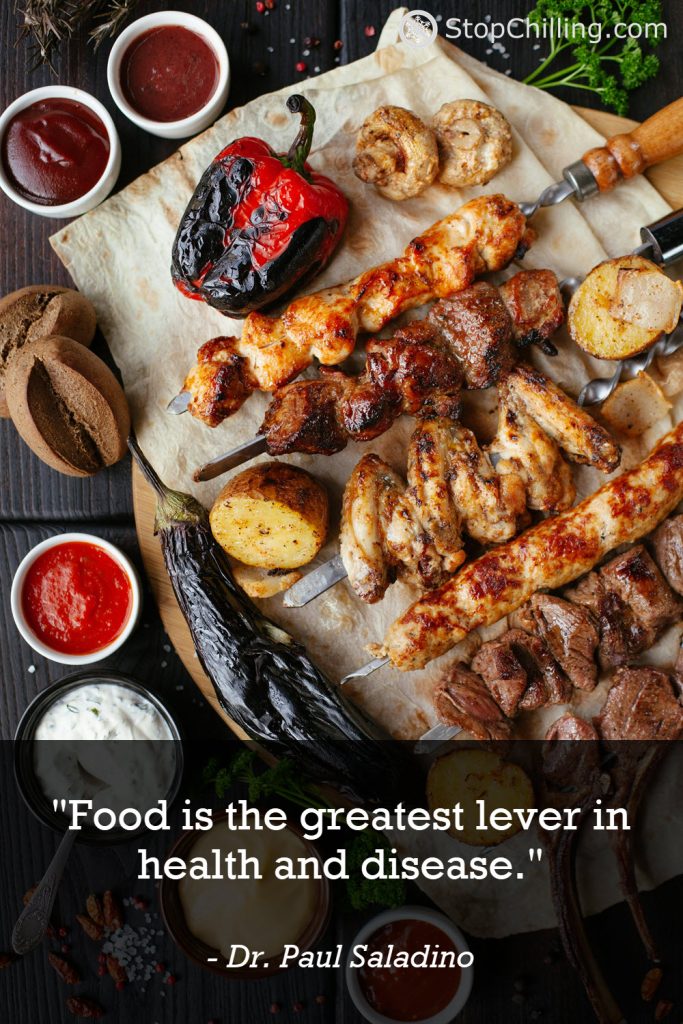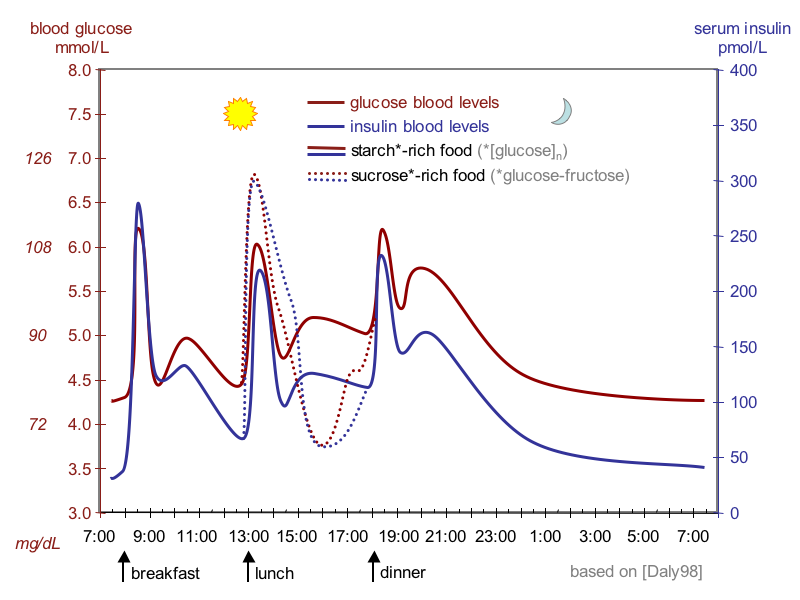Adopting healthy eating habits is essential for maintaining optimal health and well-being. By incorporating these 7 healthy eating habits into your daily routine, you can enhance your nutritional intake, support bodily functions, and promote overall vitality. This is going to be a longer post than I usually make. But you can skim through for the 7 main headings and get the main points or you can take your time and dig in to each section. I have confidence that each of these 7 healthy eating habits has significant life-improving power. So I’m trying to spend the time on each one required to communicate its value to you. When combined, these habits are life-changing.
1. Take a Whole-Food Vitamin & Mineral Supplement
Even with a balanced diet, it can be challenging to obtain all the necessary nutrients solely from food. And, due to genetic differences, each of us struggles to obtain different vitamins and minerals from food. So, we each have gaps in our nutrient absorption that affect how we grow, heal, and feel. Supplementing with a high-quality, whole-food-based multivitamin ensures you receive essential vitamins and minerals to support various bodily functions.
Multivitamins can fill nutritional gaps, especially when dietary intake is insufficient. Evidence from the COSMOS trial, a large, randomized, placebo-controlled study with about 5,000 participants, suggested that multivitamin supplementation could have beneficial effects. In the study, older adults (65 years and older), specifically saw cognitive benefits from simply taking a daily multivitamin. Among the benefits were improved cognition and slowing of cognitive aging by approximately 60%. (source: COcoa Supplement and Multivitamin Outcomes Study)
2 Pitfalls to Avoid When Selecting a Multivitamin
Toxic Additives: All multivitamin supplements aren’t created equal. You can pay $12 for a multivitamin or you can pay $30. Read the labels. Cheaper supplements tend to contain the following non-medicinal ingredients.
- Titanium Dioxide (TiO2): known to cause DNA damage.
- Magnesium Stearate (flow agent): known to cause digestive problems.
- Microcrystalline Cellulose (filler made from wood chips up to 95% of supplement): may cause digestive issues
- Aluminum: linked to neurotoxicity, Alzheimer’s Disease, etc.
- Food Dyes: known to cause hyperactivity, cancer, DNA damage, etc.
Higher quality supplements avoid the use of toxins in their formulations. take a look at the 2 lists of non-medicinal ingredients in the image below. These are taken from the labels of actual products. I’m sure you can tell which one you would rather put into your body.

Synthetic Vitamins: Vitamins can be extracted from actual foods where they occur in natural forms that our our bodies know how to absorb. But vitamins can also be synthesized through various industrial processes. For example, synthetic vitamin E is absorbed about 50% as efficiently as its naturally occurring version. And synthetic vitamin B6 is absorbed about 40% as efficiently as its naturally occurring version. So, when selecting a multivitamin, opt for products derived from whole foods. These vitamins are more bioavailable and better recognized and absorbed by the body compared to synthetic alternatives. (sources: Synthetic vs Natural Nutrients: Does It Matter? and Bioavailability of natural and synthetic vitamins: A significant difference on Oxidative Stress Status (OSS))
A terrific multivitamin option is Garden of Life Organics Men’s Once Daily Whole Food Multivitamin.
2. Take 5 Grams of Creatine Monohydrate Daily
Creatine monohydrate is a well-researched supplement known for its benefits in enhancing muscle strength and cognitive function. But Louisa Nicola, renowned neurophysiologist, emphasizes that creatine not only supports physical performance. It also offers neuroprotective benefits by stabilizing mitochondrial function within brain cells, thereby protecting the brain against damage. (source: Creatine and Brain Development)
“I don’t care what pathology you have. I think everyone should be taking creatine. Creatine monohydrate is the most widely studied supplement. It is the cheapest and most safe supplement on the market… I’ve got my parents on it. Kids can have it… It can actually help with so many disorders as well. If you’re anxious it can help you with that… Parkinson’s … Alzheimer’s … increased bone density …”
– Louisa Nicola
A daily intake of 5 grams of creatine monohydrate can aid in improving energy levels, supporting brain health, and enhancing overall physical performance.
APS Nutrition Pure Creatine Monohydrate is a highly reviewed creatine powder you can obtain from Amazon. You can mix it with any drink but you’ll notice the powder as you swallow so it might not enhance the flavor of your beverage. But it can be sprinkled in yogurt or any other creamy food. I recommend stirring your 5 grams into a cup of water and drinking it straight.
3. Eat a High-Protein Diet
Protein is a macronutrient essential for building and repairing tissues, producing enzymes and hormones, and supporting immune function. Incorporating adequate protein into your diet can aid in muscle development, weight management, and satiety.
Sources of high-quality protein include:
• Lean meats: chicken, turkey, and lean cuts of beef
• Fish and seafood: salmon, tuna, and shrimp
• Plant-based options: legumes, nuts, seeds, and tofu
Aim to include a source of protein in each meal to maintain steady energy levels and support bodily functions.

4. Limit Refined Carbohydrates
Refined carbohydrates, such as white bread, pastries, and sugary snacks, can lead to rapid spikes in blood sugar levels. Unfortunately, these spikes are followed by crashes that may cause fatigue and increased hunger. Over time, excessive consumption of refined carbs can contribute to weight gain and increase the risk of developing type 2 diabetes.
To promote stable blood sugar levels and overall health:
• Choose whole grains: brown rice, quinoa, oats, and whole wheat products
• Opt for complex carbohydrates: vegetables, fruits, and legumes
• Read labels: avoid products with added sugars and refined flours
By limiting refined carbohydrates, you can improve energy levels and support metabolic health.
5. Avoid Foods with More Than Three Ingredients
Processed foods often contain additives, preservatives, and artificial ingredients that may be detrimental to health. A simple guideline to reduce the intake of processed foods is to avoid items with more than three ingredients listed on the label.
Focusing on whole, unprocessed foods ensures that you are consuming nutrients in their natural forms, which the body can utilize more effectively. This habit can lead to better digestion, improved nutrient absorption, and overall well-being.
6. Practice Intermittent Fasting
Intermittent fasting involves alternating periods of eating and fasting. This eating pattern has been associated with various health benefits, including improved blood sugar control and reduced inflammation.
One of the mechanisms behind these benefits is the impact on the glycemic index. By reducing the frequency of meals, intermittent fasting can lead to fewer insulin spikes, promoting better blood sugar management. Additionally, periods of fasting may enhance insulin sensitivity, further supporting metabolic health.
French biochemist, Jessie Inchauspé, also known as Glucose Goddess, outlines 4 main physiological mechanisms that make insulin spikes damaging.
- Mitochondria, the powerhouses of our cells turn glucose into energy. When you give them a glucose spike, they become overwhelmed and shut down partially producing a sense of chronic fatigue.
- Glycation is the effect of browning that turns chicken skin brown when it is roasted. All of us glycate slowly as we age. This is invisible to us but, for example, adult cartilege is browner than infant cartilege. We can’t stop glycation but we can slow it down or speed it up. Glucose causes glycation.
- Inflamation – 3 out of 5 people are going to die from inflamation-based diseases.
- Insulin stores glucose as fat and too much exposure to insulin over time causes our body to develop resistance to its effect which can eventually become type 2 diabetes.
The graph below illustrates how blood sugar (glucose) and then insulin levels spike each time we eat. Notice the 3 big spikes are meals but the smaller spikes in between them would be snacks. Studies show that keeping blood glucose and insulin levels as flat as possible is generally associate with better health and longevity.

Before starting intermittent fasting, consult with a healthcare professional to determine if it is suitable for your individual health needs.
7. Chew Food Carefully
The process of digestion begins in the mouth. Chewing food thoroughly breaks it down into smaller particles, making it easier for the digestive system to process and absorb nutrients. Proper mastication has several benefits:
• Improved nutrient absorption: thorough chewing increases the surface area of food, allowing digestive enzymes to break down nutrients more effectively.
• Reduced digestive issues: careful chewing can prevent common problems such as bloating, gas, and indigestion.
• Prevention of leaky gut syndrome: by ensuring food is adequately broken down, you reduce the risk of undigested particles entering the bloodstream, which can trigger inflammation and compromise gut integrity.
Furthermore, there is a notable correlation between chewing food thoroughly and weight loss. Several studies have demonstrated that increased mastication can lead to reduced calorie intake and enhanced feelings of fullness, which are critical factors in weight management.
Key Findings:
• Reduced Caloric Intake: A study published in the Journal of the Academy of Nutrition and Dietetics found that participants who increased the number of chews before swallowing consumed fewer calories during a meal. Specifically, chewing each bite more times than usual led to a significant decrease in overall food intake.
• Enhanced Satiety: Research highlighted by Healthline indicates that thorough chewing slows down the eating pace, allowing more time for the brain to register fullness signals. This mindful approach to eating can prevent overeating and contribute to weight loss.
• Increased Diet-Induced Thermogenesis (DIT): A study reported by the National Center for Biotechnology Information (NCBI) demonstrated that slow eating, which involves chewing food slowly and thoroughly, increases postprandial energy expenditure, known as diet-induced thermogenesis. This increase in metabolism may aid in preventing overweight and obesity.
Practical Tips:
• Mindful Eating: Focus on the taste, texture, and aroma of your food. This practice not only enhances the eating experience but also promotes slower consumption.
• Set a Chewing Goal: Aim to chew each bite a specific number of times, such as 20-30 chews, to encourage thorough breakdown of food.
• Put Down Utensils Between Bites: Resting your fork or spoon between bites can naturally slow your eating pace, giving your body time to signal when it’s full.
Taking the time to chew each bite thoroughly can support weight loss efforts, and significantly impact your digestive health and overall nutrient assimilation.
8. Bonus Habit! Avoid Seed Oils
Dr. Paul Saladino, Dr. Eric Berg DC, Robert F. Kennedy Jr., and an increasing list of experts have been warning that the consumption of seed oils—such as canola, sunflower, corn, soy, and cottonseed oils—poses significant health risks. These oils are high in linoleic acid, a polyunsaturated fat that evidence suggests is not suitable for human consumption.
According to Dr. Saladino, excessive linoleic acid accumulates in the body, leading to the expansion of fat cells and the release of free fats. This process purportedly induces insulin resistance in peripheral muscles, causing inflammation and DNA damage. He contrasts modern diets, where linoleic acid intake can constitute up to 20% of total calories, with ancestral diets—such as those of the Hadza and Maasai—where it comprised only 2-3% of total caloric intake. Dr. Saladino suggests that the overconsumption of linoleic acid is a primary driver of chronic diseases including type 2 diabetes and advocates for eliminating processed foods and seed oils from the diet to promote better health. (sources: Seed Oils & Processed Foods: How They’re Harming You and The Hateful 8 Seed Oils)
Conclusion
Incorporating these seven healthy eating habits into your daily routine can profoundly impact your health and well-being. By focusing on nutrient-dense foods, mindful eating practices, and strategic supplementation, you can support your body’s needs and promote optimal functioning. Find some ideas for incorporating healthy food choices into your busy schedule in my post, Healthy Eating on the Go: A High-Protein, Low-Carb Approach.
Call to Action: Reflect on your current dietary habits and identify areas for improvement. Challenge yourself to implement these principles and observe the positive changes they bring to your health and vitality. Start today and take proactive steps toward a healthier you.


Leave a Reply
You must be logged in to post a comment.